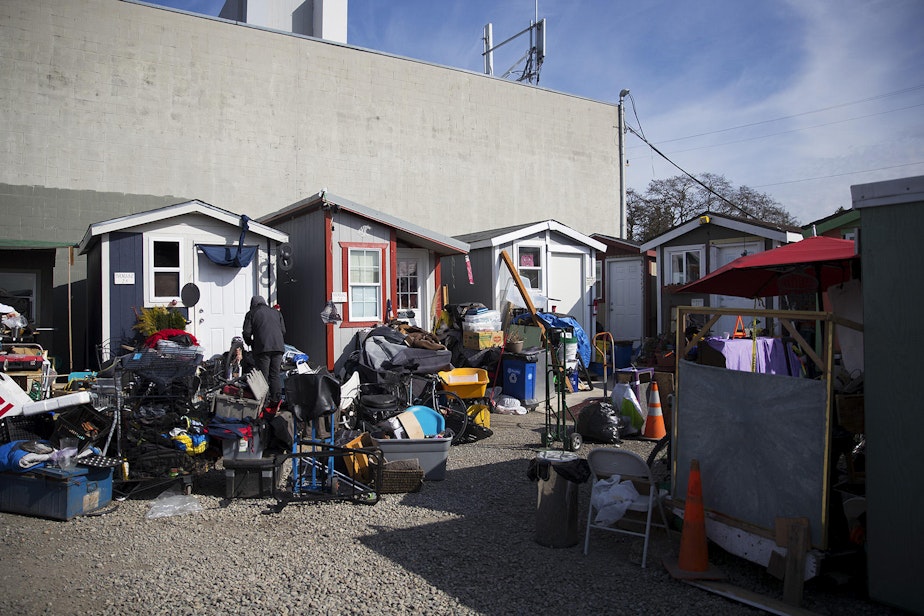'I'm scared.' Residents react to tiny house closures in north Seattle

Neighbors and homeless residents are displaying very different responses to the news that a city-sanctioned tiny house village in North Seattle will close early next year.
"I'm scared, I'm nervous, I just think I'll be back out on the streets in six months," said village resident Stacy Malmoe.
The two-year city permit for the Licton Springs tiny house village expires in March 2019. The city does not plan to extend the permit or relocate the village, according to officials.
This is the first time since the city started using tiny house villages as part of their strategy to address homelessness that one will be phased-out.
The Licton Springs site opened on Aurora Avenue North in 2017 and was controversial from the get-go. Unlike most other villages and shelters in the city, alcohol and drug use are allowed at the Licton Springs site.
It was designed as an option for chronically homeless people in Seattle who deal with some of the most complex issues. All residents have been referred by the city’s Navigation Team, which does outreach and closes unauthorized camps.
Earlier this year, the site faced vocal opposition from some neighbors who say they’ve seen negative impacts since it opened.
Jim Sullivan lives just a few blocks from the village. He said he associates it with a significant increase in crime.
“As a resident, I haven’t seen really any positive results from the camp being here,” Sullivan said. He said he believes that’s partly because it’s a low-barrier site.
Sullivan said the closure is unfortunate for those who really need assistance, but he’ll be glad to see it go.
“I’m very excited and I can’t speak for my neighbors but I’m sure when we have a dialogue everyone will be ecstatic about it because everyone has had some sort of situation with the burglaries, the camping, the prostitution, the [car] prowls,” he said.
Sullivan acknowledges that the Aurora corridor has long been a haven for prostitution and drug use. But he said crime has spread further into the neighborhood since the village opened.
Proponents of the site take a very different view.
Elizabeth Dahl is a neighbor and a member of the Licton Springs tiny house village Community Advisory Council. She said the site has saved lives.
“People who were dying are now healthy, people who were addicted became sober, people were accessing services and resources,” Dahl said in a statement.
Malmoe, who has been a resident at the village for about a year and a half, said it’s been good for her.
“It’s not big, it’s not a lot. But it’s more than a sidewalk,” Malmoe said. “I was really happy to be here. I was on Aurora for 10 years without a place to live and that’s a long time,” she said.
Malmoe said it’s not just a tiny house village, it’s people’s lives that are being impacted.
“And if we’re not here, where are we going to be?" Malmoe asked. "They say we don’t want them in the neighborhood, well you shut this down and they’re going to be right on your doorstep.”
Staff at the village say residents, who learned of the closure Tuesday evening, are still processing the news.
Some seem more optimistic than Malmoe after hearing from city officials who say they’re committed to getting all 53 residents at the village into permanent housing before the closure.
But even officials acknowledge that’s a long shot.
Only 33 people were moved from tiny house villages across Seattle into permanent housing in the first six months of 2018. The number of tiny house villages has gone up this year, but the rate at which people are leaving for housing has gone down by 5 percent over the same time last year.
Service providers say the lack of affordable housing makes it difficult.
The city is adding case managers to the Licton Springs site to try to meet their goal. If residents remain when the March deadline comes around they could be moved to other tiny house villages or beds in the city’s enhanced 24 hour shelters.
The closure of the Licton Springs site highlights what appears to be a shift in the way the city wants these villages operated. City officials say lessons have been learned from the Licton Springs site, including that participation in case management and housing searches should be required.
The announcement of the closure has raised questions on camp management by SHARE/WHEEL, the organization that operates a number of camps alongside the Low Income Housing Institute (LIHI). Proponents say the group is not getting sufficient resources, opponents say SHARE/WHEEL staff are not doing enough to encourage residents to move into permanent housing.




